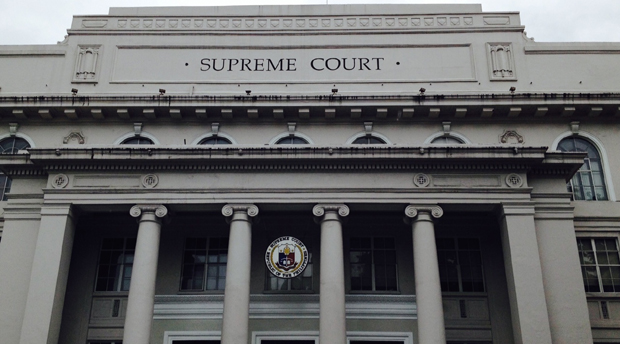MANILA, Philippines–As much as P12 billion was slashed from the judiciary’s proposed 2015 budget by the Department of Budget and Management (DBM) in the expenditures program it submitted to the House of Representatives.
The Supreme Court on Thursday asked the House appropriations committee to retain and approve its proposed P32 billion budget instead of the P20.3 billion the DBM sought on its behalf.
Deputy Court Administrator Raul Villanueva briefed the committee on the proposed budget for the judiciary, noting that its budget contained in the P2.606 trillion national budget represented only a 4.88 percent increase from last year.
Lowest in recent years
“From 2011 to 2015, the increase in the judiciary’s budget is lower than the increase in the national budget for each year. As a result thereof, the declining appropriation to the judiciary’s budget resulted in a share of only 0.78 percent in the national budget, one of the lowest in recent years,” he said.
Villanueva said the high court’s original proposed budget of P32.6 billion would have represented a 1.25-percent share in the national budget.
Chief Justice Maria Lourdes Sereno did not appear at the hearing nor did the other Supreme Court justices, except Associate Justice Diosdado Peralta. In attendance were justices from the Sandiganbayan and Court of Appeals.
Grilled on JDF
Villanueva asked the lawmakers to include the P12 billion that was cut by the executive department from its budget, saying the money would support programs in progress, among others, those for court docket decongestion and modernization of the judiciary.
Committee members grilled Villanueva on the controversial Judicial Development Fund (JDF), but he deflected most of the questions in deference, he said, to Sereno who wrote an Aug. 13 letter to Speaker Feliciano Belmonte Jr. asking that no member of the judiciary be involved in the committee on justice hearings on the JDF.
Sereno told Belmonte she was making the request in order to preserve judicial independence, and while the Supreme Court had not yet resolved the motion for reconsideration filed by the executive with respect to the decision on the Disbursement Acceleration Program (DAP).
Retaliation
DAP petitioners and judiciary employees alike have described the House JDF probe as a retaliation on the judiciary and an effort to pressure Sereno and her colleagues in the high court amid deliberations on the DAP appeal.
The 30-year-old JDF is derived from legal fees, bail bonds and other payments to courts. It is controlled by the Chief Justice but its spending is limited to the augmentation of the allowances of court personnel and the purchase, repair or maintenance of office equipment and facilities.
Lawmakers called for an investigation into the JDF in the aftermath of Supreme Court rulings striking down the DAP, a stimulus program launched by the administration in 2011, for practices it considered unconstitutional, including cross-border transfers of funds and the use of savings before the end of the fiscal year.
Details on funding sources
Kabataan Rep. Terry Ridon wondered if the multibillion fund could rightly be described as the “last bastion of the pork barrel,” in the wake of the Supreme Court rulings declaring the DAP and the Priority Development Assistance Fund (PDAF) unconstitutional.
Villanueva, however, begged off from answering the question, citing Sereno’s letter.
He gave a similar response to other questions related to the JDF and the DAP.
But upon prompting by congressmen, Villanueva promised to provide the committee a copy of the Supreme Court’s records on the JDF, including audit reports.
Abakada Rep. Jonathan de la Cruz said the list should contain a “disaggregation” of the fund, including details on funding sources and how it was used.
Right to justice
Other lawmakers, including Cagayan de Oro Rep. Rufus Rodriguez, expressed support for the Supreme Court’s request for additional funding, saying the right to justice was as important as the right to health and education.
Of the budget proposed for the judiciary in 2015, the Supreme Court and lower courts shall get the lion’s share with P18.1 billion while the Sandiganbayan will receive P410 million, the Court of Appeals P1.466 billion and the Court of Tax Appeals P253.8 million.–With a report from Tarra Quismundo
RELATED STORIES
Judiciary suffers declining budget share under Aquino admin
SC mum as solons rant about JDF as last living pork barrel
